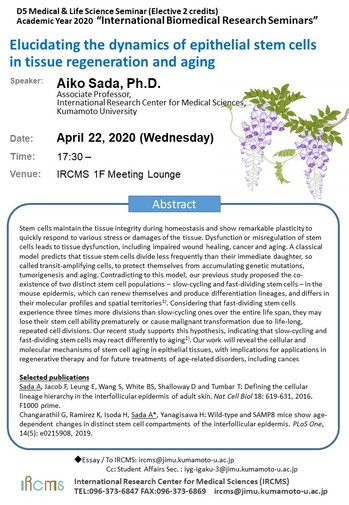- HOME
- News & Events
- Cancelled [Apr 22] D5 Medical & Life Science Seminar-Dr. Aiko Sada
News & Events
Cancelled [Apr 22] D5 Medical & Life Science Seminar-Dr. Aiko Sada
March 30 2020
This seminar was cancelled due to COVID-19.
The "D5 Medical & Life Science Seminar" course will be offered by International Research Center for Medical Sciences (IRCMS). It will run from April 2020 to March 2021, with lectures given by scientists who are affiliated with IRCMS or in collaboration with researchers at IRCMS. The lectures will be given once a month, in English, and by leading scientists in the relevant research field. Students will be taught: 1) how normal physiological functions are maintained in the human body; 2) how these systems become abnormal under certain pathophysiologic conditions; 3) why stem cells are important in animal development and homeostasis; 4) how stem cell-based approaches can help us understand disease mechanisms and find potential cure for diseases related to stem cell malfunction (e.g., cancer, aging).
Date : April 22, 2020 (Wednesday)
Time : 17:30 -
Venue : IRCMS 1F Meeting Lounge
Speaker : Aiko Sada, Ph.D.
Associate Professor, IRCMS
Title : Elucidating the dynamics of epithelial stem cells in tissue regeneration and aging
Abstract :
Stem cells maintain the tissue integrity during homeostasis and show remarkable plasticity to quickly respond to various stress or damages of the tissue. Dysfunction or misregulation of stem cells leads to tissue dysfunction, including impaired wound healing, cancer and aging. A classical model predicts that tissue stem cells divide less frequently than their immediate daughter, so called transit-amplifying cells, to protect themselves from accumulating genetic mutations, tumorigenesis and aging. Contradicting to this model, our previous study proposed the co-existence of two distinct stem cell populations - slow-cycling and fast-dividing stem cells - in the mouse epidermis, which can renew themselves and produce differentiation lineages, and differs in their molecular profiles and spatial territories1). Considering that fast-dividing stem cells experience three times more divisions than slow-cycling ones over the entire life span, they may lose their stem cell ability prematurely or cause malignant transformation due to life-long, repeated cell divisions. Our recent study supports this hypothesis, indicating that slow-cycling and fast-dividing stem cells may react differently to aging2). Our work will reveal the cellular and molecular mechanisms of stem cell aging in epithelial tissues, with implications for applications in regenerative therapy and for future treatments of age-related disorders, including cancer.
Selected publications
- Sada A, Jacob F, Leung E, Wang S, White BS, Shalloway D and Tumbar T: Defining the cellular lineage hierarchy in the interfollicular epidermis of adult skin. Nat Cell Biol 18: 619-631, 2016. F1000 prime.
- Changarathil G, Ramirez K, Isoda H, Sada A*, Yanagisawa H: Wild-type and SAMP8 mice show age-dependent changes in distinct stem cell compartments of the interfollicular epidermis. PLoS One, 14(5): e0215908, 2019.

